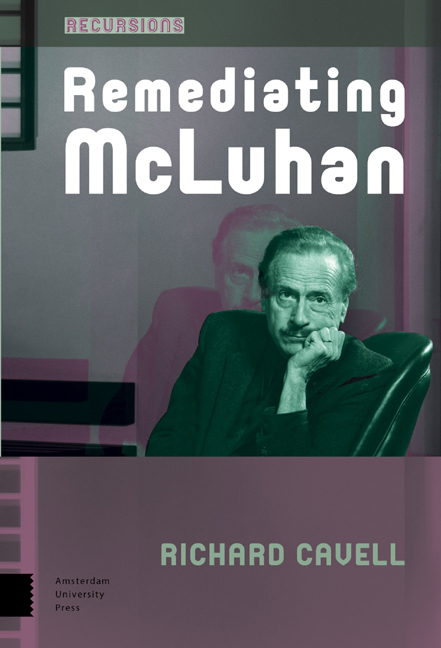Book contents
- Frontmatter
- Dedication
- Contents
- Introduction
- List of sigla
- I
- Re: Mediation
- 1 Beyond McLuhanism
- 2 McLuhan and the Question of the Book
- Embodiment as Incorporation
- 3 McLuhan and the Body as Medium
- 4 McLuhan, Tactility, and the Digital
- 5 Mechanical Brides and Vampire Squids
- Empathic Media
- 6 McLuhan: Motion: e-Motion: Towards a Soft Ontology of Media
- 7 Re-Mediating the Medium
- Determining Technology
- 8 McLuhan, Turing, and the Question of Determinism
- 9 Angels and Robots
- Being Mediated
- 10 Marshall McLuhan’s Echo-Criticism
- 11 McLuhan and the Technology of Being
- II
- 12 The Tragedy of Media: Nietzsche, McLuhan, Kittler
- Coda: On the 50th Anniversary of Understanding Media
- Notes
- Works Cited
- Index
11 - McLuhan and the Technology of Being
Published online by Cambridge University Press: 12 December 2020
- Frontmatter
- Dedication
- Contents
- Introduction
- List of sigla
- I
- Re: Mediation
- 1 Beyond McLuhanism
- 2 McLuhan and the Question of the Book
- Embodiment as Incorporation
- 3 McLuhan and the Body as Medium
- 4 McLuhan, Tactility, and the Digital
- 5 Mechanical Brides and Vampire Squids
- Empathic Media
- 6 McLuhan: Motion: e-Motion: Towards a Soft Ontology of Media
- 7 Re-Mediating the Medium
- Determining Technology
- 8 McLuhan, Turing, and the Question of Determinism
- 9 Angels and Robots
- Being Mediated
- 10 Marshall McLuhan’s Echo-Criticism
- 11 McLuhan and the Technology of Being
- II
- 12 The Tragedy of Media: Nietzsche, McLuhan, Kittler
- Coda: On the 50th Anniversary of Understanding Media
- Notes
- Works Cited
- Index
Summary
[C]ulture is best seen not as complexes of concrete behavior patterns—customs,usages, traditions, habit clusters—as has, by and large, been the case up to now, but as a set of control mechanisms—plans, recipes, rules, instructions (what computer engineers call “programs”) for the governing of behavior. […] [M]an is precisely the animal most desperately dependent upon such extragenetic, outsidethe- skin control mechanisms, such cultural programs, for ordering his behavior.
Clifford Geertz, The Interpretation of Cultures (1973)As the terms ‘Facebook’ and ‘YouTube’ suggest, we are increasingly experiencing our being via technologies of mediation; if Facebook implies an extension of corporeality, YouTube more complicatedly points towards an extension of our conscious self. Brian Rotman has expressed this phenomenon as a process of ‘becoming beside ourselves’, which suggests the displacement of fixed notions of being by processual notions of becoming, and the way in which these processes are taking us beyond defined notions of selfhood—from the self to the ‘selfie’. McLuhan's media theory pertains directly to this increasingly relational sense of being emerging from the mediascape through his argument that media are effecting ‘an evolutionary […] [shift] from biology to technology’ in which ‘the body becomes the old hardware environment,’ and ‘media [the] means of extending and enlarging our organic sense lives into our environment’ (The Book of Probes, pp. 111, 155).
Insights such as these derive from McLuhan's sense of media as embodied; as he put it, media are both extensions and amputations of the body and, with the computer, that process extends to consciousness itself. In conjunction with this extension theory, McLuhan developed an environmental or ecological theory of mediation, bringing the two notions together in his 1967 tour de force, The Medium is the Massage, a book that is so brilliant in terms of its design that its importance for McLuhan's thought tends to be overlooked. As Schnapp and Michaels put it in The Electric Information Age Book,
[T]he turn from message to massage was more than a public relations gambit or an addition to the already extensive catalog of McLuhan puns. It signals two broader shifts. The first is in McLuhan's thought, from his prior insistence on […] ‘extension’ to the more forceful concept of the ‘total media work-over’.
- Type
- Chapter
- Information
- Remediating McLuhan , pp. 115 - 124Publisher: Amsterdam University PressPrint publication year: 2016



